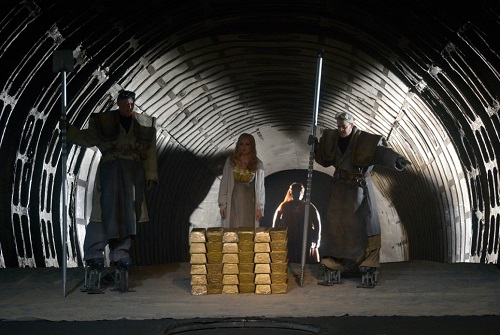 Germany Wagner, Das Rheingold: Orchestra of the Deutsche Oper / Donald Runnicles (conductor). Deutsche Oper, Berlin, 13.4.2017. (JMI)
Germany Wagner, Das Rheingold: Orchestra of the Deutsche Oper / Donald Runnicles (conductor). Deutsche Oper, Berlin, 13.4.2017. (JMI)

Production:
Direction – Götz Friedrich
Sets and Costumes – Peter Sykora
Cast:
Wotan – Derek Welton
Alberich – Werner Van Mechelen
Loge – Burkhard Ulrich
Fricka – Daniela Sindram
Fasolt – Albert Pesendorfer
Fafner – Andrew Harris
Erda – Ronnita Miller
Freia – Martina Welschenbach
Mime – Paul Kaufmann
Donner – Noel Bouley
Froh – Attilio Glaser
Woglinde – Meechot Marrero
Wellgunde – Christina Sidak
Flosshilde – Annika Schlicht
My main reason for making this trip to Berlin was to attend Der Ring des Nibelungen at the Deutsche Oper. The performances are planned to be the final ones of Götz Friedrich’s well-known stage production, which many opera lovers know as the ‘Time Tunnel’ Ring. The announcement of this event raised an unprecedented interest, and it has been more than a year since tickets for the full cycle disappeared.
The Friedrich production had its premiere in 1984 under the Deutsche Oper musical director at the time, Jesus López Cobos. After 33 years, it can still be attended with pleasure: it always serves the music and libretto perfectly.
The production is dominated by a large tunnel that runs through the back of the stage and appears throughout The Ring. An excellent use of props and accessories allows for scene changes. Thus the scene of the Rhine is achieved with the use of transparent curtains that are very cleverly moved. The initial scene of the gods is perfectly set, with a curtain at the end of the tunnel where you can see a rocky landscape with Valhalla above. The Nibelheim is shown below the main stage, which works just fine. Finally, the return to the place of the gods is accomplished by showing the entire tunnel; the characters enter through an illuminated background. The costumes are fairly timeless, with the gods clad in white. If something must be highlighted here, it is the excellent lighting.
The plot is perfectly narrated and avoids any new reading or what has been called Konzept Regie. It seems a pity to me that this production is going to be retired since it is still enjoyed by the audience. The most delicate moments are always well resolved, as is the case with Alberich’s transformations or the stacking of gold for payment to the giants. The appearance of Erda and her admonition to Wotan is also well handled. The weakest aspects were a rather childish Donner and the odd ballet movements of the gods as they entered Valhalla.
There is no doubt that Donald Runnicles, the current Music Director of the Deutsche Oper, is a brilliant conductor, and he has proved it through the course of his long career. But for me, his conducting competes with my memories of recent Rings that I have attended under Daniel Barenboim, Kirill Petrenko and Christian Thielemann. They are in a separate category, especially the last two, and anyone who has to be compared with them pays a high price. However, Donald Runnicles’ conducting was remarkable, and there were some brilliant, even exciting, moments. Under his baton was the always superb Orchestra of the Deutsche Oper.
Wotan was sung by Australian baritone Derek Welton, who joined the company at the beginning of this season. I had heard him earlier in Parsifal and Les Huguenots, and he made a positive impression. His debut as Wotan was impressive: he has a strong and attractive voice and was always credible on stage. He is more a baritone than a bass-baritone, and he fell a little short on the low notes, but altogether it was a very satisfying interpretation.
Dutch bass-baritone Werner Van Mechelen as Alberich was unconvincing in vocal terms. Alberich is a secondary character in Siegfried and Götterdämmerung, but in Das Rheingold he is almost the protagonist.
Loge is an audience favourite, and this was no exception. The role was sung by Burkhard Ulrich, who was terrific on stage, even though vocally his voice is more suited to Mime than to Loge.
Daniela Sindram was a faultless Fricka. As for the Giants, I found Albert Pesendorfer’s Fasolt disappointing in vocal terms, short of amplitude and rather tight. Andrew Harris was better in the role of Fafner.
Martina Welschenbach as Freia was correct, and the same can be said of Paul Kaufmann as Mime. Ronnita Miller did nicely in the role of Erda: her voice was convincing and her performance had mystery and even emotion. Noel Bouley as Donner fell short in vocal terms, while Attilio Glaser was well-suited to Froh. The Rhine daughters were good.
José M. Irurzun